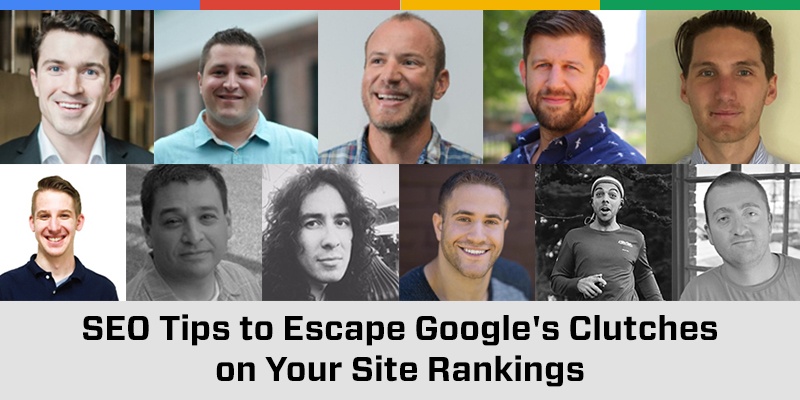SEO Tips to Escape Google's Clutches on Your Site Rankings
Allison Casey Digital Marketing Director, Partner#Digital Marketing, #Industry Insights, #SEO

Diagram's Allison Casey shares tips from 11 SEO experts that include ways to avoid sudden drops in your website rankings.

Do you feel like your website is caught in Google’s clutches?
Are you startled by your low rankings in search results?
Is keeping up with the changes in how Google evaluates the value of a website a nightmare?
Focusing on SEO and organic traffic growth can seem like a ghastly part of any marketer’s job. Those of us who have the responsibility of managing our organic channel most likely have experience the hair raising conversation with our boss about why our traffic and leads have declined.
But don’t despair! In the spirit of Halloween, we’d like to share what some SEO professionals find scary. They will also provide some “treats” so you can avoid the jump scare of seeing your site pages drop to page 2.

Work Towards the Right Goals (not Ghouls)
Nothing derails an SEO strategy quicker than not having a clear goal to work towards. A good SEO strategy is all about achieving the goals that will have a specific impact on the business. This could be anything from building links, improving authority or increasing organic search traffic. SEO is always changing, but having a clear goal means you can adjust your strategy without losing traction. A goal needs to be useful, precise and achievable and everyone involved needs to know what they are working towards. After all, it's impossible to score when you don't have a goal to aim for.

A Product Page without Schema Markup is a Horror!
Google can display rich results such as rating stars, pricing and availability in the SERPS when the correct structured data is on the page. It is a scary affair to see a page without Schema so check out the Structured data documentation that Google provides to learn more!

Educate your Team to Avoid Spooky Mistakes
In high growth companies it's critical to prioritize evangelism. Help your team understand the do's and don't's of SEO so you can scale your impact & avoid spooky mistakes that could slow down your growth.

Your Site is Doomed without Good User Experience
With the introduction of the Rankbrain machine learning algorithm, it means that user experience is more important than ever. Links might persuade Google to rank you on the first page, but to stay at that top position, you need to provide a flawless user experience, whilst fulfilling the user's search query intent. It's important that SEOs work closely with website designers and copywriters so that everyone is on the same page, and are striving for the same goals. Too many times, I've seen newly built websites handed from a web design agency to an SEO with the message "Ok, now do the SEO". Business owners and agencies need to understand that a web presence is a cohesive asset, and true success comes from collaboration.

Vanishing Structural Changes = an SEO Nightmare
A spooky SEO nightmare scenario: wake up to find out that mission-critical structural changes on the site have been reverted. Canonical tags are gone, robots.txt is empty, etc. Even worse, the site is rapidly indexed after a robots noindex meta tag suddenly appears on every page... 😱
Fortunately, with comprehensive acceptance testing baked into the deployment process, SEOs can rest easy knowing that their hard work won't go up in smoke without warning.
There are a number of ways to approach this, with the end goal being a fool-proof system that assures your SEO changes aren't accidentally reverted:
- Titles/descriptions remain intact
- Canonicals self-referencing
- Robots.txt unchanged
- Redirects are supported
- Images/content modules appear
- Etc.

Experience Campaign Horrors if You Don’t Trust the Source
For me, the scariest part of SEO isn’t the techniques, the algorithm updates or the search engine results; I find the most frightening part to be the community chatter.
Between the forums, social media groups, influencer blogs, it’s easy for an SEO specialist to get mixed up between the data and the ‘shiny objects.’ Many of these ‘gurus’ come out with their unique perspective as to what’s taking place in the industry, but, at times, this could be more dangerous than beneficial, leading to a horror of a campaign.
It’s best to ensure that when receiving information about SEO action items, algorithm updates and more, that you fully trust the source providing the information. This will allow you to create an effective strategy, based off authentic information, that produces sustainable results.

Don’t Be Unlucky with Google Analytics
My Horror of SEO is a new client's analytics account. It's almost always a mess, with incorrect data and bad attribution, yet it's also almost never scoped properly. So you don't actually get full access until the client signs on the dotted line. And when you peek inside, you notice that you'll have to go backwards to fix this mess, first, before you can actually do anything you were hired for. Data-driven marketing is BS for this reason. Sure, there's data in there. But you're not going to be able to actually use it, or base your new campaign decisions off it, until you stop Google Analytics from lying to you.

Avoid Tricks by Learning from SEO Experts in Your Industry
I think we've all tried the "seo best practices" by this point. How are they working out for you? Diminishing returns you say? Tons of wasted time you say? To that end, I recommend you stop reading blogs written by SEO "gurus." If you're like me, you've found their advice only works in the digital marketing space. Want to improve your SEO? Don't follow the people who come up when you Google "backlinks." Ask people (like us) who to follow in SEO: people like Nick Eubanks, Ryan Stewart, Rebecca Gill and Matthew Howells-Barby (among others). Then, take a good hard deep dive into what's actually working in your industry and consider how you can improve on that.

Bloodcurdling Amounts of Data
I’d say if there is a scary part to SEO it’s the sheer mountain of data and information you get bombarded with which is continually being updated and adapted. Working in an agency I used to be able to lean on some of the in-house systems to process this data. Working as a consultant now, I’m finding I have to develop my own processes and that can be a bit daunting at times. What AI and Machine Learning bring to the table is also great but a little scary at times!”

The Dangers of Website Migrations and Overgrown Content
Failing to redirect users when relocating or removing pages from your website can be detrimental to the user experience. Think of that pesky air mattress you probably have at home. One hole in the plastic and likely the once luxurious night sleep you were expecting has fallen flat. The same goes for your organic search campaign and it's one of the reasons that website migrations are so dangerous for any business. It only takes one tear to unravel all the momentum that's been built up.
We often talk about content that's duplicate or thin in the SEO industry, but many times forget to mention what's irrelevant and superfluous. More content isn't always the best path forward, especially when you're working in eCommerce where the stakes are high. On-page content that isn't directly related to your core audience is doing more harm than good for your authority in search. Taking some time to define your content guardrails and trim back some of the excesses can have a huge positive impact on your business.

The Darkness of Local Search
Scary may be subjective here, but one of the tougher things I find in local search, and more broadly is in the last few years, Big G has taken a less is more approach when it comes to punishing us naughty SEOs. Where before we'd have a more clear indication of our wrongdoings (manual penalty, deindexed, etc), I've observed more times than not there is no word either way. Maybe this is a scale thing, maybe this is intentional. As a result, coming back from a negative action requires more detective work (and time), and you can often be shooting in the dark for months.
I recently experienced something like this with a Cannabis GMB listing for a client in California. One location had zero issues getting approved. The next one, total headache. The explanation from Google made no sense, and we were left trying all kinds of 'interesting' things to get verified. If Google would just give us a clear answer, we'd be on our way, and would not have to get extra creative. Alas, if their goal (similar to locksmiths maybe?) is to make it really hard to get a listing, thus making it harder for spammers...well, it's keeping the legit folks out too. Many, I am sure, now turning to tactics they otherwise would not have.
Boo!
It can be terrifying to stay on top of SEO changes and know how to adjust your organic traffic growth strategy. How do you know how to trust to help you escape Google’s House of Horrors?
First, stay educated! These SEO professionals are a part of a community members of TTT. TTL is one of my favorite treats in the SEO community to stay informed and avoid the frightening experience of not being in the know.
Second, make sure you understand any SEO technical issues or content issues your website faces and fix them!
Lastly, don’t freak out! SEO is a constantly evolving marketing skill and even if it’s your full-time job, can be overwhelming to know everything.
Thanks to all of our SEO professionals and their advice and insights to help us escape the clutches of Google.
Related Posts

Why You Need an SEO Content Audit in your Migration Plan
Diagram's Allison Casey spills all her insider SEO tips on migrating your content the right way.

The Google Leak and Creating Content That Doesn't Suck
This year's leak of Google's internal SEO documents underscored the need for web content that doesn't suck. But here's what else we learned...
Results Matter.
We design creative digital solutions that grow your business, strengthen your brand and engage your audience. Our team blends creativity with insights, analytics and technology to deliver beauty, function, accessibility and most of all, ROI. Do you have a project you want to discuss?
Like what you read?
Subscribe to our blog "Diagram Views" for the latest trends in web design, inbound marketing and mobile strategy.
